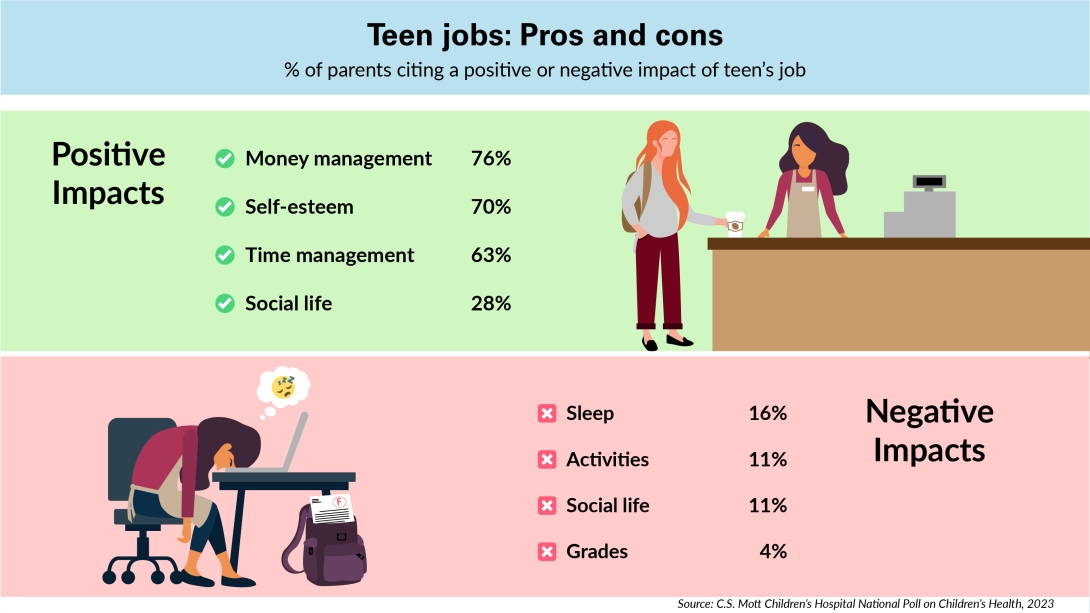Story by Beata Mostafavi / UM Health Lab
For many teens, that first formal job as a fast-food cashier, barista or lifeguard is a rite of passage.
Over half of parents of 18-year-olds in a national poll say their teen works, compared to a little more than two fifths of parents of teens ages 16-17 and 8% of parents of kids aged 14-15.
And while some families tout the positives of job experiences, such as improving their teen’s money management skills and self-esteem, others worry about the potential to negatively impact sleep, schedules and grades, according to the University of Michigan Health C.S. Mott Children’s Hospital National Poll on Children’s Health.
But finding a job that meets logistical considerations – with schedules and transportation topping the list of importance – may be the key to minimizing any negative consequences, experts say.
“Having a part time job at a young age can teach responsibility, independence and help teens gain valuable experiences,” said Mott Poll co-director Sarah Clark, M.P.H. “But taking on too much can have an adverse effect on a teen’s physical and mental health. Parents can play a big role in helping their teen find a job that meshes with the teen’s and family’s needs.”
Biggest influencers on parents’ support of teens working
More than three fourths of parents of working teens believe having a formal job has a positive impact on their teen’s money management while self-esteem ranked high on the pros list for 70% of parents and 63% see social benefits.
Parents of teens who don’t work express concerns that having a job could negatively impact their teen’s grades, involvement in activities, sleep or social life. Teens are more likely to see positive benefits, with less family conflict, when they are in a job that is appropriate for their circumstances.”
Teens are more likely to see positive benefits, with less family conflict, when they are in a job that is appropriate for their circumstances.” – Sarah Clark, M.P.H.
But logistics topped parents’ list as the most important considerations for whether a job is appropriate for their teen, with more than four in five saying it depends on whether hours fit with their teen’s schedule and two thirds worried about the convenience of getting them to and from the job. More than half of parents also wanted a job to provide a learning experience for their child.
“Families should have upfront conversations about logistical factors when teens are thinking about looking for a job, and certainly before they make any commitment,” Clark said. “Teens need to be realistic about time needed for schoolwork, as well as extracurricular activities, family commitments, and planned social events in order to prevent the new responsibility from negatively impacting their grades, health and other parts their life.”
Among parents of teens who work, nearly half also say their teen has experienced workplace problems, with top issues including getting as many hours as promised, having to work more hours or later hours and disagreements with coworkers or managers.

“Many teens will feel anxious about being in an unfamiliar situation, having someone evaluate their performance, and dealing with more demands on their time,” Clark said. “Parents need to continually assess whether the job is having a negative burden on their teen.”
Clark offers more advice for parents of teens considering taking on a job.
Teen jobs: 6 expert pieces of advice for parents to consider
- Have honest conversations about logistics and time commitmentAmong questions parents should ask: how will teens get to their job and how will adding this to their schedule potentially interfere with other commitments such as schoolwork, extracurricular activities, social lives and family time?“Teens often are juggling several commitments at school and home and need to have an accurate picture of how much of their time they can and are willing to give up to fit in a job,” Clark said. “Parents who may be responsible for logistics like transportation should also consider how a teen job may impact them and their family’s schedule.”
- Help them find the right jobLearn about the motivation for getting a job. For some teens, the goal may be to develop valuable connections or gain experience for future career opportunities.For others, it may be the extra money to go toward something they’re saving for.Parents should provide guidance as their kids consider what jobs to pursue, Clark says.
“Teen employment may a good opportunity for some young people to earn their own money and help them learn to develop new skills, such as time and financial management, problem-solving, and teamwork,” Clark said. “But not every job is right for every teen. Parents can guide discussions with their child to make sure a job is the right fit for them. Teens are more likely to see positive benefits, with less family conflict, when they are in a job that is appropriate for their circumstances.”
- Help teens prepare for and manage new workplace situationsMany parents indicate their working teen has experienced job-related problems, reinforcing the need for parents to be proactive in talking with their teen about their job, Clark says.“Teens may feel overwhelmed by some of the new challenges that come in a workplace setting. Some will encounter new situations they don’t know how to handle, including challenging interactions with customers, co-workers, or managers,” Clark said. “Parents can be a sounding board for teens to express their worries and help them develop problem-solving skills by brainstorming solutions together and exploring ways to resolve conflicts.”
- Educate yourself on labor laws regarding minorsJust one in three parents polled say they feel very informed about state laws for teen employment. Parents should be aware of restrictions on total hours and on the times that teens are allowed to work, as well as safety measures such as rules around operating equipment. If parents suspect an issue of compliance with employment laws, they should encourage their teen to find a different job that better supports their health and safety. “Parents with working teens should take steps to become knowledgeable about state laws for teen employment to ensure that their child’s rights, education, and safety are protected,” Clark said.
- Consider informal job opportunities for younger teensWhile teens ages 14-15 are allowed to hold a formal job in many states, the options may be limited. Informal jobs like babysitting, pet sitting and lawn mowing are good options to allow teens to gain confidence and experience. Parents can help younger teens get started by introducing them to friends and neighbors who may have informal tasks, by outlining how to do a good job, and talking with them about different challenges they encountered.
- Establish expectations around how earnings will be usedMost parents polled say teens use their job money to pay for personal items, followed by savings. Less than a third say the pay goes towards activities. Whether a teen has a formal or informal job, parents may want to establish some guidance for what teens do with their earnings. For many families, teens use their earnings for “extras” – personal items that go beyond what parents provide. In other circumstances, teens are expected to use job earnings to cover the costs of participating in extracurricular activities or to save for college. Setting expectations, Clark says, will help parents and teens avoid conflict in this area.









